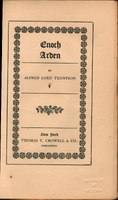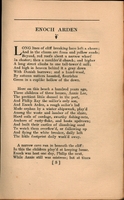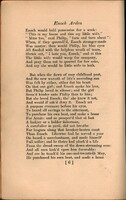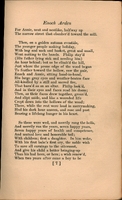Alfred Lord Tennyson & Enoch Arden
Alfred Lord Tennyson was born in Somersby, Lincolnshire, England on the 6th of August, 1809. The fourth son of twelve children, (one of whom, George, passing away in infancy) Alfred Tennyson was raised in a happy well-off family and spent his early life as a “story-teller” who “loved to sit in the firelight on winter evenings, with his brothers and sisters around him, recounting stories of knights and heroes” (Life and writings of Alfred Lord Tennyosn by Arthur Turnbull, page 5.)
Tennyson began writing at a young age and was aided by his brothers who were also skilled poetic writers, leaving his home, the Somersby Rectory, at the age of seven Tennyson became a student at the King Edward VI Grammar School in Louth. After spending four years in Louth, Tennyson returned home with a solid grasp on Latin and received further education from his father who used the family library to grow Tennyson’s mind. As is, Tennyson displayed early signs of greatness, writing an epic six thousand line poem around the age of twelve as well as drams in blank verse. Indeed, it was clear from an early age that Tennyson had the “knack of rhyming and verse-making” (Turnbull, page 6.)
It was not long after arriving at Trinity College in 1827 that Tennyson met, and befriended, Arthur Henry Hallam who – after his early and sudden passing – became the inspiration for Alfred Tennyson’s magnum opus, In Memoriam A.H.H. Published seventeen years after its beginning, In Memoriam would go on to become so well read by the masses and the queen that during the same year of publication, Alfred Tennyson would be honored as poet laureate. As is, the history which surrounds Alfred Lord Tennyson is vital to understand because it aids the reader in better understanding how Alfred Tennyson used his position to aid social justice causes.
Indeed, although Tennyson published Enoch Arden years after In Memoriam his work was still well received and well read by the masses. Moreover, as Tennyson was well aware of his position and prestige at the time, it may seem likely that he would use his position in order to gain more wealth. Opposing this however, Tennyson decided to focus his efforts on improving social causes and with Enoch Arden, helped women of his era become more independent.
Moreover, due to common laws of Tennyson’s time, women in England, Canada, United States and other countries, were not allowed to remarry if their husbands became absent without proof of death. As is, if a women’s husband was lost at sea and his body was never recovered or found – an idea which was not uncommon during the 19th century – she would be unable to remarry or be allowed to be labeled a widow. Although the harshness of these laws was subdued overtime, Tennyson’s work truly aided in the fight for women to leave their husbands if they became absent for any reason. In time, laws were set in place that allowed women to leave their husbands if he was absent for a number of years – usually seven – and not face the problem of breaking bigamy laws.
Although it may be argued by some that Tennyson had little influence on the passing of the legislature, it should be noted that Enoch Arden was heavily influential in the opposition of bigamy, so much so that when new laws were set in place, Enoch Arden was used in the naming of the doctrine. As is, the Enoch Arden Doctrine is currently defined by the Cornell Law School as a statute in which “some states contain a statute applicable when a spouse, believing for a certain period of time that the other spouse is dead, marries another. If the original spouse returns, the marrying spouse may get a divorce. The length of time required varies depending on the laws of the particular state in question. The name of the statute comes from an 1864 poem by Alfred, Lord Tennyson” (Legal Information Institute: www.law.cornell.edu/wex/enoch_arden_doctrine.) Interestingly, it is found that in Canadian law if someone is found guilty of bigamy, they may be sentenced to seven year of imprisonment, around the same amount of time that most U.S States require a spouse to be absent in order to not be charged for bigamy (Supreme Court of Canada: www.scc-csc.lexum.com/scc-csc/scc-csc/en/item/15058/index.do.)






